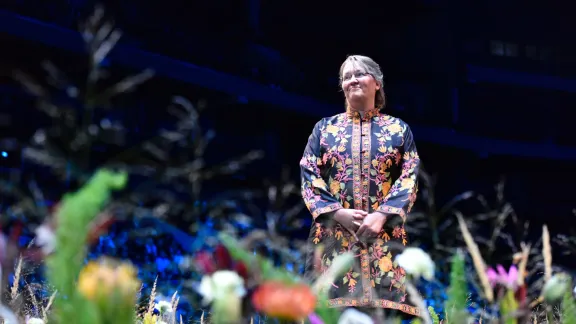
Ms Maria Immonen, director of LWF World Service, said practical ecumenical collaboration, âshows that faith and life are inseparable.â
The head of LWF World Service encourages closer cooperation at Caritas Internationalis General Assembly
(LWI) - Practical collaboration between Lutherans and Catholics is vital because it represents the visible consequence of ecumenical theological endeavours. That was the message which the head of the Lutheran World Federation (LWF) World Service department, Maria Immonen, took to the Caritas Internationalis (CI) General Assembly.
In a keynote address to the Assembly, taking place in Rome from 23-28 May, Immonen spoke of the dramatic changes affecting all those involved in humanitarian assistance, development aid and advocacy. Faced by these challenges, she said, “joint commitment and service to the marginalised people in this world” is “all the more important.”
In her words to members of the global Caritas federation, Immonen stressed that World Service shares an identical mission “to work with those most in need.” She highlighted the shared work of Catholics and Lutherans leading up to the 500th anniversary of the Reformation in 2017 and, in particular, the joint commemoration led by Pope Francis and the LWF leadership in the Swedish cities of Lund and Malmö the previous year.
Declaration of Intent
During that event, she noted that she and CI Secretary General Michel Roy signed a Declaration of Intent, committing to find ways of working more closely together, both locally in countries where the two organizations are present, and globally through advocacy at international level.
Such practical ecumenical collaboration, Immonen said, “shows that faith and life are inseparable.” She referred to the bible story of the Transfiguration to illustrate the deep connection between justice and justification, between the encounter with Christ and the call “to witness to God’s liberating and transforming power in our world.”
Noting the way in which those who defend the rights of refugees, International Humanitarian Law, the environment, and international cooperation appear to be “increasingly ridiculed, questioned and marginalized,” Immonen stressed that “joint action, collaboration and learning from each other can make an important difference.
Our combined front line response is like no other network existing globally.
She listed several areas where Lutherans and Catholics could cooperate more effectively together, starting with their work to support refugees and internally displaced people. “Our combined front line response is like no other network existing globally,” she said, adding that capacity building at local level presents opportunities for a “deep ecumenical engagement which fosters mutual understanding and trust.”
Immonen also pointed to joint engagement in the UN’s Sustainable Development Goals, under the theme of “leaving no-one behind.” She spoke of the shared challenges of safeguarding and of combating the erosion of women’s rights as “misogynist, fearful voices are becoming louder,” wanting to halt women and girls’ participation in a more just and equal world.
Immonen ended her address with an example from Nepal where church leaders heard about the Declaration of Intent and met to find ways of putting that ecumenical commitment into practise. With almost no budget, but with joint planning, monitoring, training and implementation, Lutherans and Catholics together built a water system for their rural community. Our sometimes small resources, put together,” Immonen concluded, “can result in the miracle of feeding the thousands.”


